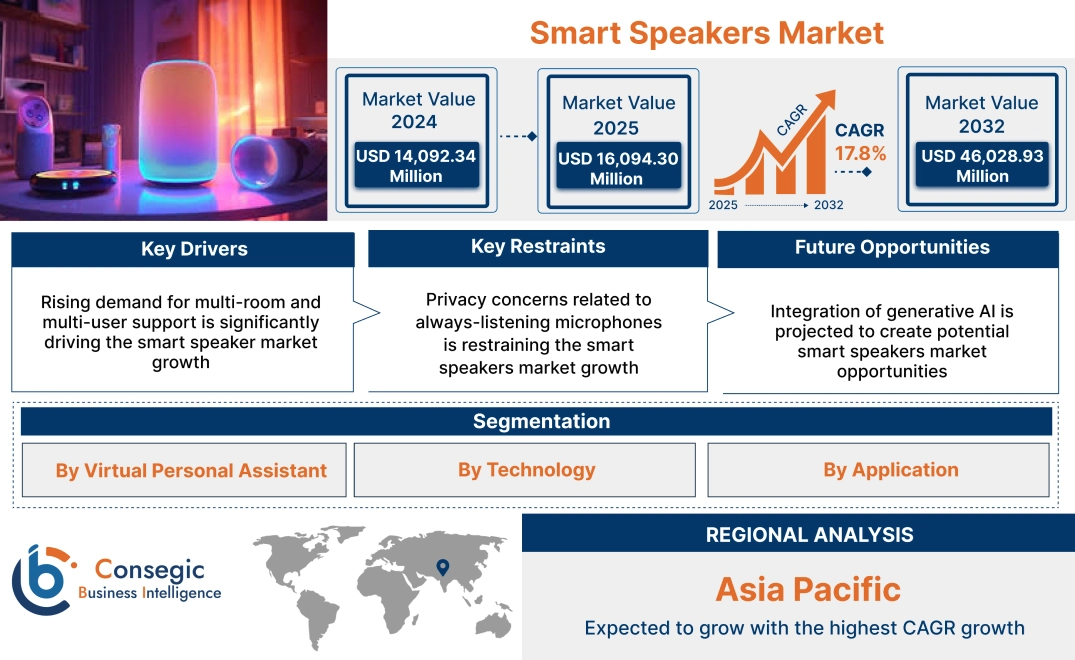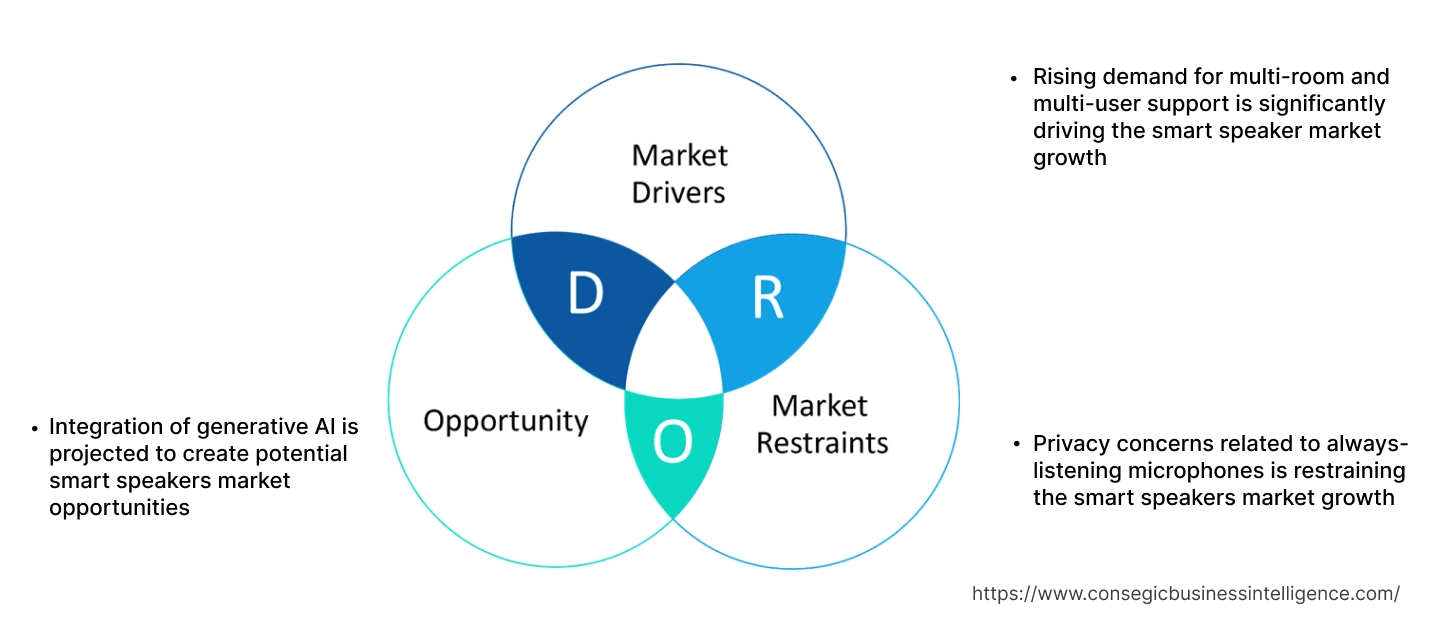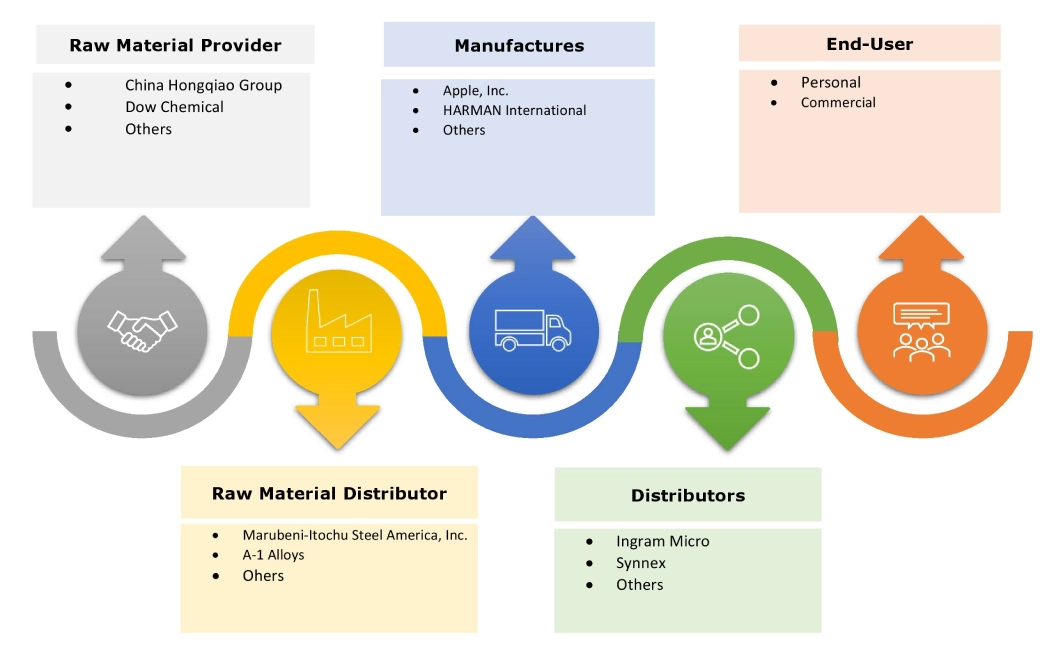- Summary
- Table Of Content
- Methodology
Smart Speakers Market Size:
Smart Speakers Market Size is estimated to reach over USD 46,028.93 Million by 2032 from a value of USD 14,092.34 Million in 2024 and is projected to grow by USD 16,094.30 Million in 2025, growing at a CAGR of 17.8% from 2025 to 2032.
Smart Speakers Market Scope & Overview:
Smart speakers are voice-activated devices that act as a hands-free assistant. They can play music, answer questions, set alarms, and control other smart devices in home. They use a built-in microphone to listen for voice commands and connect to the internet to access information and perform actions.
Key Drivers:
Rising demand for multi-room and multi-user support is significantly driving the smart speaker market growth
The increasing demand for multi-room audio functionality and personalized user experiences is a significant catalyst for growth within the smart speaker market. These features enhance consumer value proposition by enabling synchronized, whole-home audio entertainment and individual profile management, thereby broadening the appeal of smart speaker devices. This trend compels manufacturers to innovate and incorporate these functionalities into their product offerings, further stimulating smart speakers market expansion.
- For instance, in November 2022, DEFUNC has strategically partnered with Salora International, a Delhi-based consumer electronics company, to facilitate its entry into the Indian market. This alliance will leverage Salora's established distribution network and market expertise to effectively bring DEFUNC's range of audio products, including smart home speakers and TWS earbuds, to Indian consumers.
Thus, as per the analysis, increasing demand for multi-room and multi-user support is driving the smart speakers market share.
Key Restraints:
Privacy concerns related to always-listening microphones is restraining the smart speakers market growth
Users hesitate due to fears of eavesdropping, data collection, and a lack of transparency from companies. Negative publicity from privacy scandals and media coverage further fuels distrust. Strict data protection laws and legal challenges add to the burden for manufacturers. Consequently, smart speaker adoption remains limited, hindering the market's potential. While companies are making efforts to address these concerns, overcoming deep-seated user anxieties and establishing trust is crucial for the industry's future.
Thus, as per the smart speakers market analysis, privacy concerns is impeding the smart speakers market share.
Future Opportunities :
Integration of generative AI is projected to create potential smart speakers market opportunities
Generative AI enables more personalized conversations, moving beyond simple commands to offer proactive assistance and tailored recommendations. This technology unlocks new possibilities including content creation (poems, stories, music), advanced information retrieval, and improved task automation, from booking travel to controlling smart homes. Increased user engagement and adoption, driven by these enhanced capabilities, is expected to fuel market expansion. Companies that successfully leverage generative AI will gain a competitive edge, fostering further innovation and transforming smart speakers from basic assistants into powerful, versatile devices.
- For instance, in June 2024, Amazon announced a major overhaul of its Alexa service by integrating conversational generative AI. This revamp aims to make Alexa more intelligent and capable of engaging in more natural and complex conversations. To offset the costs of this upgrade, Amazon is considering a two-tiered service model, with a basic version and a premium version that offers enhanced features. This move signals Amazon's commitment to staying competitive in the rapidly evolving AI assistant market and its ambition to transform Alexa into a more valuable and indispensable part of users' lives.
Hence, based on the analysis, integration of generative AI presents significant smart speakers market opportunities.
Smart Speakers Market Segmental Analysis :
By Virtual Personal Assistant:
Based on virtual personal assistant, the market is categorized into Amazon Alexa, Google Assistant, Apple Siri, and others.
Trends in the Virtual Personal Assistant:
- Amazon leverages its strength in e-commerce and content services to enhance the value of Alexa smart speakers. Integration with Amazon Music, Prime Video, and Audible makes Alexa a strong contender for entertainment needs.
- Google Assistant benefits from Google's vast knowledge graph and AI expertise. This gives Google Assistant a significant advantage in understanding natural language, providing accurate information, and offering helpful, contextual responses.
Amazon Alexa accounted for the largest revenue share of 35.20% in 2024
- Amazon is investing in AI to make Alexa more proactive in managing the home, including features like anticipating user needs, offering smart home routines, and providing personalized recommendations for automation, thus driving the smart speakers market trend.
- Alexa is becoming better at understanding the context of conversations and user requests, leading to more relevant and personalized experiences. This includes remembering past interactions, learning user preferences, and adapting to different situations.
- Moreover, Amazon is incorporating generative AI into Alexa to improve natural language understanding, enable more conversational interactions, and provide more helpful and personalized responses.
- For instance, in March 2023, Amazon launched the 5th generation of its popular Echo Dot smart speaker, touting significant improvements in audio quality. The new Echo Dot boasts a redesigned audio architecture that delivers clearer vocals and deeper bass compared to previous models. Additionally, Ultrasound Motion Detection allows for automated lighting control when someone enters a room, while an embedded ambient temperature sensor enables smart home routines to activate compatible AC units when the room gets too warm.
- Thus, as per the analysis, the aforementioned factors are driving the Amazon Alexa smart speakers market size.
Apple Siri segment is expected to register the highest CAGR over the forecast period
- Apple's focus on on-device processing for Siri enhances privacy and improves response times, which is a key differentiator for privacy-conscious users and attract more customers to the HomePod ecosystem.
- Siri is deeply integrated with Apple devices and services, providing smooth and consistent experience for iPhone, iPad, Mac, and Apple Watch users. This tight integration is a major advantage for Apple and could drive HomePod sales among existing Apple customers.
- Additionally, the growing trend to expand Apple’s HomeKit ecosystem, adding support for more smart home devices and features.
- For instance, in July 2024, Apple launched the HomePod mini, a small but powerful smart speaker made entirely from recycled mesh fabric. Standing just 3.3 inches tall, the HomePod mini packs impressive audio quality into a compact design.Its seamless, acoustically transparent mesh exterior and edge-to-edge backlit touch surface make it a visually appealing addition to any room.
- Consequently, as per smart speakers market analysis, Apple Siri has the potential for growth in the smart speaker market, particularly by focusing on its strengths in privacy, ecosystem integration, and audio quality.
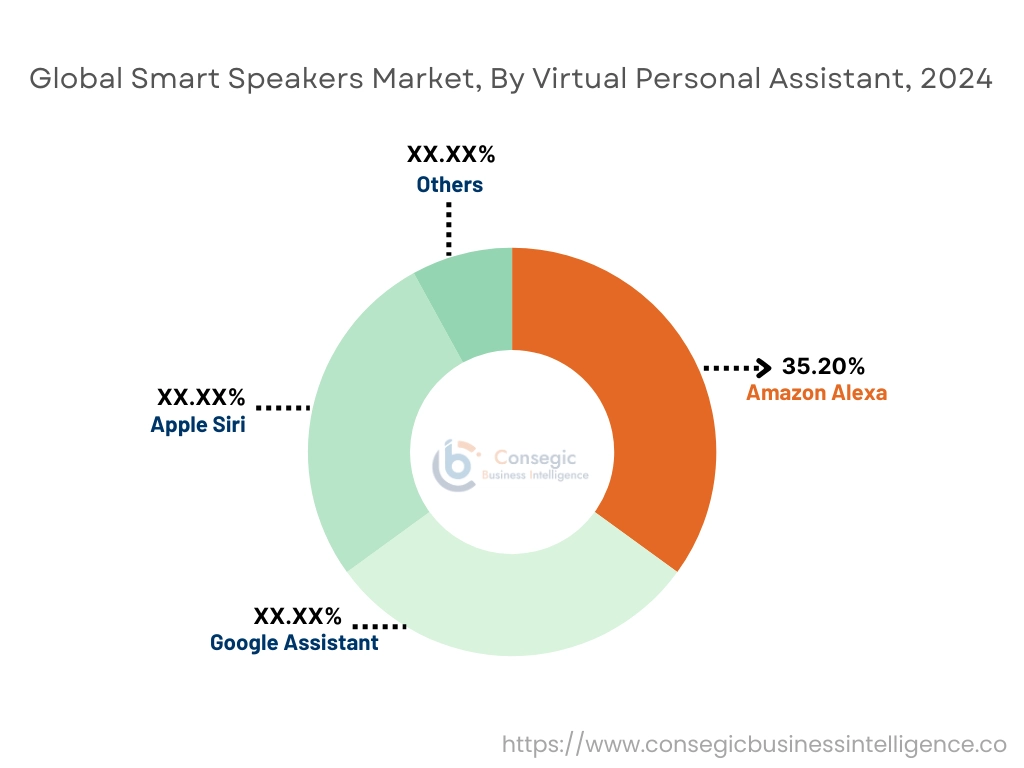
By Technology:
Based on the technology, the market is segmented into Bluetooth/WiFi, Near Field Communication (NFC), and Others.
Trends in Technology:
- Improvements in Bluetooth codecs (like aptX HD and LDAC) are enabling higher-quality audio streaming to smart speakers, rivaling wired connections.
- NFC can be used to trigger specific actions or playlists on a smart speaker based on the NFC tag scanned. For instance, tapping a music album cover to the speaker could start playing that album.
Bluetooth/WiFi segment accounted for the largest revenue share in 2024 and is also predicted to witness the fastest growth
- Wi-Fi connectivity supports cloud-based processing, allowing virtual assistants to provide real-time responses to user queries, thus driving the Wi-Fi smart speakers market trend.
- Wi-Fi facilitates the connection of smart speakers with other smart home devices, creating a cohesive and interconnected smart home ecosystem and this trend is expected to continue as more and more devices become part of the smart home network.
- Bluetooth-enabled smart speakers offer easy wireless pairing with smartphones, tablets, and other devices, enabling users to play audio content directly from their personal devices.
- For instance, in September 2024, Samsung Electronics launched Music Frame WICKED speaker, designed to seamlessly integrate into any home decor.The Music Frame WICKED speaker is equipped with built-in Alexa and Chromecast, enabling smart home control and integration with compatible devices. Additionally, with versatile connectivity options like Bluetooth and Wi-Fi, the Music Frame WICKED speaker caters to a wide range of audio needs.
- Therefore, the aforementioned benefits offered by Bluetooth/WiFi are bolstering the smart speakers market size.
By Application:
Based on the application, the market is segmented into personal use and commercial use.
Trends in the Application:
- Smart speakers are becoming central to home entertainment, offering voice-controlled access to music streaming, podcasts, and audiobooks. High-fidelity audio capabilities and seamless integration with other smart devices are enhancing the user experience.
- Businesses are using smart speakers to provide interactive customer support, answer FAQs, and offer personalized recommendations, improving customer engagement and streamlines service processes.
Personal Use accounted for the largest revenue share in the year 2024 and is also projected to witness the fastest growth during the upcoming years
- Smart speakers serve as the central command hub for a growing number of smart home devices, enabling users to control lights, thermostats, appliances, and security systems with their voice.
- Hands-free access to audiobooks and podcasts has made smart speakers a popular choice for entertainment while multitasking or relaxing.
- New digital platforms are emerging to connect consumers with accredited e-waste disposal facilities and driving smart speakers industry demand.
- For instance, in October 2024, Bose launched the SoundLink Home Bluetooth Speaker, the latest addition to their SoundLink family. This compact yet powerful speaker offers premium sound quality in a stylish design that complements any home decor. With wireless capabilities and versatile functionality, the SoundLink Home Speaker provides both exceptional audio performance and aesthetic appeal, making it the perfect choice to enhance any space with music.
- Therefore, the aforementioned factors are contributing significantly in accelerating the smart speakers market demand.
Regional Analysis:
The global Smart Speakers market has been classified by region into North America, Europe, Asia-Pacific, MEA, and Latin America.
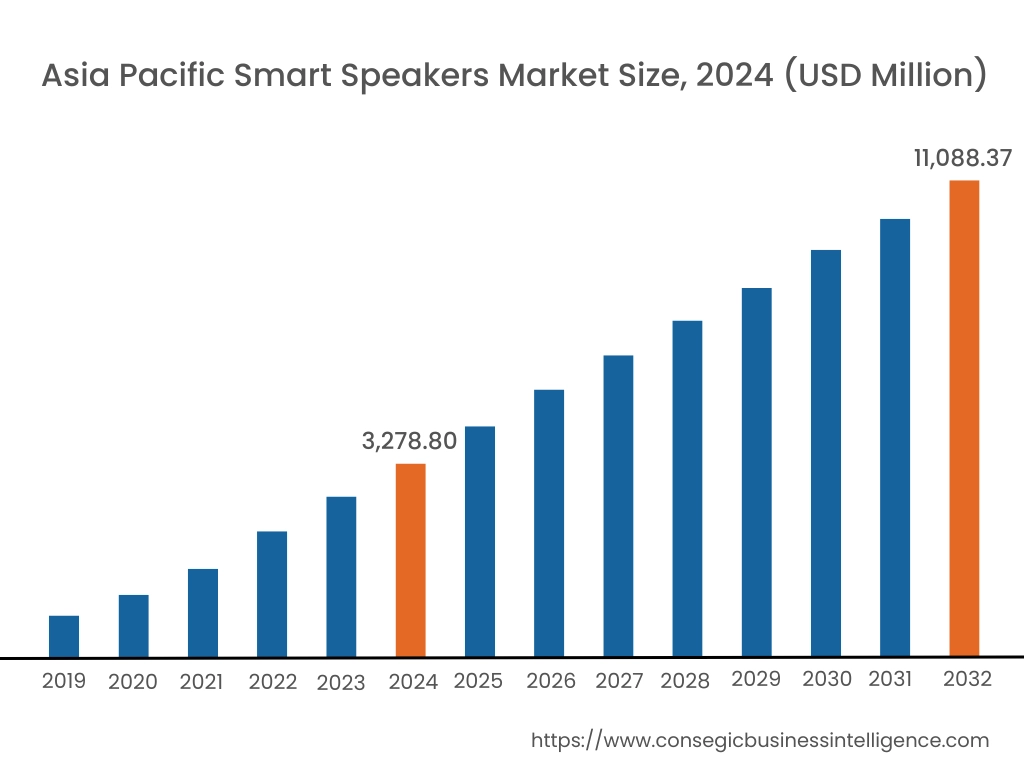
Asia Pacific region was valued at USD 3,278.80 Million in 2024. Moreover, it is projected to grow by USD 3,755.63 Million in 2025 and reach over USD 11,088.37 Million by 2032. Out of these, China accounted for the largest revenue share of 39.0% in 2024.
Internet and smartphone penetration rates are increasing rapidly across the region, creating a larger potential user base for smart speakers. These devices rely on internet connectivity and are often controlled through smartphones. Additionally, as smart home technology gains traction in Asia Pacific, smart speakers are becoming essential components of connected home ecosystems. They serve as central hubs for controlling various smart home devices, further driving their adoption. Moreover, voice assistants like Google Assistant and Alexa are gaining popularity in Asia Pacific. This trend is fueling smart speakers market demand, which are the primary interface for interacting with these voice assistants.
- For instance, Xiaomi launched its Smart Speaker with IR control. This speaker doubles as a remote for compatible home appliances like air conditioners, leveraging its built-in IR blaster. Integrated with Google Assistant, the Xiaomi Smart Speaker allows voice control of smart home devices. Users can manage all connected devices through the Mi Home app.
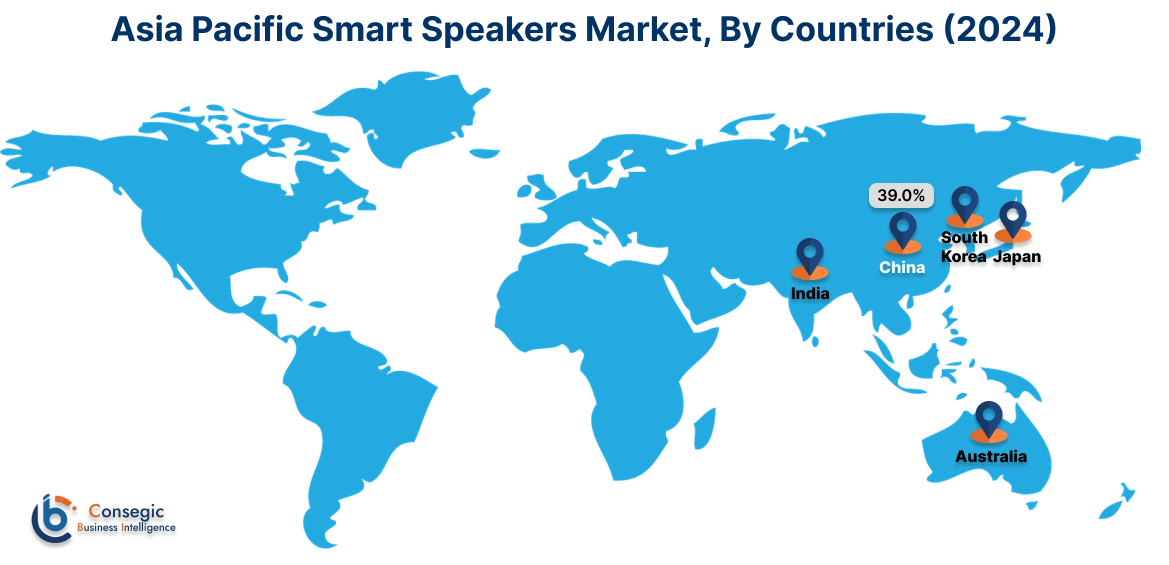
North America was valued at USD 5,652.10 Million in 2024. Moreover, it is projected to grow by USD 6,456.27 Million in 2025 and reach over USD 18,503.63 Million by 2032.
North America is witnessing a significant surge in the adoption of smart home devices. Smart speakers serve as central hubs for controlling and integrating these devices, further driving their popularity. In addition, leading smart speaker manufacturers with their strong presence, coupled with aggressive marketing strategies and extensive product ecosystems, is also fueling market smart speakers market expansion.
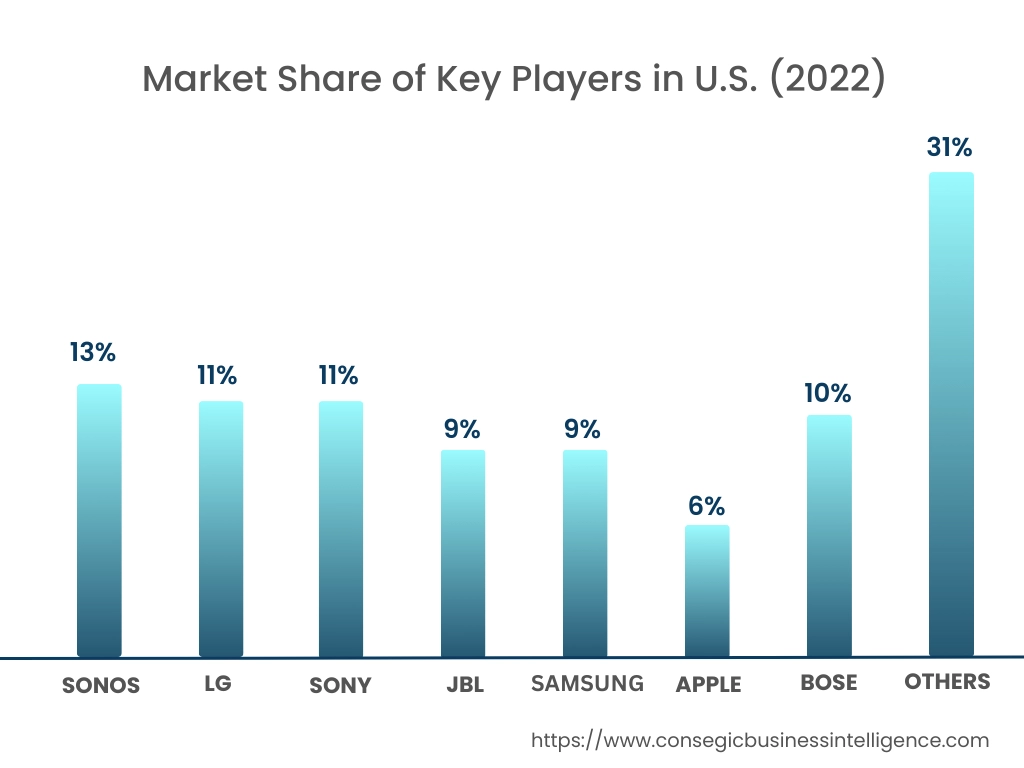
As per the smart speakers market analysis, Europe has a well-established smart speaker market and is expected to continue its steady growth, driven by increasing demand for multi-room audio systems and advanced features like personalized recommendations and improved natural language processing. Moreover, the Latin American smart speaker market is still in its early stages but has significant growth potential. Additionally, there's a growing interest in integrating smart speakers with smart home devices, reflecting the ME&A region's increasing focus on smart city initiatives and modern living.
Top Key Players and Market Share Insights:
The market is highly competitive with major players providing smart speakers to the national and international markets. key players are adopting several strategies in research and development (R&D), product innovation, and end-user launches to hold a strong position in the market. Key players in the smart speakers industry include-
- Apple, Inc. (U.S.)
- Amazon.com, Inc. (U.S.)
- Bose Corporation(U.S.)
- HARMAN International (U.S.)
- Sonos, Inc. (U.S.)
- ULTIMATE EARS (U.S.)
- Baidu, Inc (U.S.)
- Sony Corporation (Japan)
- Panasonic Holdings Corporation (Japan)
- Xiaomi (China)
- Google LLC (U.S.)
Recent Industry Developments :
- In January 2024, Sonos has expanded its Architectural line of in-ceiling speakers with the introduction of an 8" model. Developed in partnership with Sonance, the 8" In-Ceiling Speaker offers a new size option for customers seeking discreet, high-quality audio solutions. This addition complements the existing Sonos Architectural offerings, providing installers and homeowners with greater flexibility in designing their sound systems.
- In Nov 2021, Noveto revealed its N1 smart speaker, featuring Alexa and Smart Beaming technology. This innovative speaker delivers personal 3D binaural audio without the need for headphones.
Smart Speakers Market Report Insights :
| Report Attributes | Report Details |
| Study Timeline | 2019-2032 |
| Market Size in 2032 | USD 46,028.93 Million |
| CAGR (2025-2032) | 17.8% |
| By Virtual Personal Assistant |
|
| By Technology |
|
| By Application |
|
| By Region |
|
| Key Players |
|
| North America | U.S. Canada Mexico |
| Europe | U.K. Germany France Spain Italy Russia Benelux Rest of Europe |
| APAC | China South Korea Japan India Australia ASEAN Rest of Asia-Pacific |
| Middle East and Africa | GCC Turkey South Africa Rest of MEA |
| LATAM | Brazil Argentina Chile Rest of LATAM |
| Report Coverage |
|
Key Questions Answered in the Report
How big is the smart speakers market? +
The smart speakers market size is estimated to reach over USD 46,028.93 Million by 2032 from a value of USD 14,092.34 Million in 2024 and is projected to grow by USD 16,094.30 Million in 2025, growing at a CAGR of 17.8% from 2025 to 2032.
What specific segmentation details are covered in the Smart Speakers report? +
The smart speakers report includes specific segmentation details for virtual personal assistant, technology, application, and regions.
Which is the fastest segment anticipated to impact the market growth? +
In the smart speakers market, the Asia Pacific is the fastest-growing segment during the forecast period.
Who are the major players in the smart speakers market? +
The key participants in the smart speakers market are Apple, Inc. (U.S.), Amazon.com, Inc. (U.S.), Bose Corporation(U.S.), Baidu, Inc (U.S.), Sony Corporation (Japan), Panasonic Holdings Corporation (Japan), Xiaomi (China), Google LLC (U.S.), HARMAN International (U.S.), Sonos, Inc. (U.S.), ULTIMATE EARS (U.S.) and Others.
